Sandeep Dwivedi, COO, ITQ, believes that technology is the way forward for travel, not only in easing the complicated businesses, but also for companies to remain relevant. Technology offers immense potential to enhance the tourism industry and make it more accessible, efficient, and sustainable for all, he says.
Nisha Verma
Sandeep Dwivedi, Chief Operating Officer, Interglobe Technology Quotient (ITQ), said that technological advances have changed the way we travel. “From the advent of the mobile boarding pass to the rise of the Online Travel Agency (OTA), technology has changed the way consumers plan, pay for and go on trips, and these new developments promise an even more interactive and
exciting experience. The Global Passenger Survey 2021 conducted by IATA showed that passengers are looking to new technology to give them more control, information and improve efficiency when they travel, but the human touch remains important. Around 43 per cent of passengers prefer to use a travel agency, travel management from or corporate travel department to book their flights,” he said.
Way forward
He pointed out that the travel industry, among so many others, underwent an overnight transformation owing to COVID-19, as flights were cancelled in record numbers and borders started to close. “When the pandemic started, travel and hospitality were still undergoing a digital transition and the situation at that time clearly indicated that technology is the only way forward for tourism. In response to the pressing requirement, ITQ made use of its VR3 application, which allowed travel retailers to amend any pre-booked ticket with only a few clicks by enabling PNR void, reissue, refund, and revalidation. Another ITQ innovation, the E-ticketing application, allowed them to create an e-ticket and transmit it all at once to the client from the website. The distinct features of these two projects helped manage the time to preserve all the PNRs data locally and provided a solution to the main issue facing the travel industry and travellers following the pandemic,” he added.
According to studies conducted by Google, Dwivedi mentioned, only 13 per cent of travellers still use travel agencies to organise their journeys, while 74 per cent plan their trips online, and remaining of them still depend on the traditional methods. “This is a glaring proof that travel has dramatically shifted its paradigm towards the use of technology. Today’s travellers are adept at using technology for their benefit, know exactly what they want, and expect their travel agents to present them with an abundance of choice,” he claimed.
He underlined that smart travellers of today look for platforms that offer a one-stop shop for all their travel requirements, from booking flights to booking hotels, something that makes their travel hassle-free and cost-effective. “This is where technical advancements play a role. The advantages of technology innovation will give travel retailers an edge to understand the need and requirement of their customers and plan their itinerary accordingly. The most recent developments in digital transformation, ranging from IOT, AI, Augmented Reality, and Virtual Reality will help the travel retailers provide more focussed services to their customers, making travel more experiential based than destination driven,” informed Dwivedi.
Innovations
When it comes to new technologies entering the travel industry, Dwivedi said, “The introduction of new technologies to the travel sector has been greatly aided by the pandemic. With the emergence of artificial intelligence and mobile devices, customers expect a much greater level of personalization than ever before. These are the main reasons why the travel industry is consistently striving to find new and innovative ways of integrating breakthrough technologies into its operations. Advanced travel search engines, AI dynamic pricing engines, dynamic scheduling systems, internet of things, augmented reality and virtual reality, contactless amenities, AI chatbots, and UV-light-sanitizing robots for hotels, aircraft, and airports are all examples of the technological innovations that are ruling the industry today.”
Aiming for ease
Sharing details on tech innovations at ITQ, he said, “We are constantly working to use technology to streamline the complicated nature of the sector and make travel retailing quicker, simpler, and more up to date. Our official partner Travelport has developed a technologically advanced platform called Smartpoint Cloud, which will soon be introduced to the Indian market.”
 TravTalk India Online Magazine
TravTalk India Online Magazine





